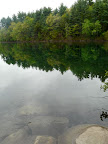Walden Pond revisited
 A posting a short while ago talked about important distinctions often lost these days: between environmentalism and ecology, between conservation as a human choice and a false worship of nature's non-existent wishes. Henry David Thoreau was an early American prototype of the Romantic movement's anti-social and anti-civilization tendencies. He spent two years at Walden Pond (1845-47), a small and shallow, glacially-cut lake in Concord, just outside Boston, living in a hut. The hut is gone, although there's a replica there now, and Walden Pond and the area around it have been conservation land since the late 19th century.
A posting a short while ago talked about important distinctions often lost these days: between environmentalism and ecology, between conservation as a human choice and a false worship of nature's non-existent wishes. Henry David Thoreau was an early American prototype of the Romantic movement's anti-social and anti-civilization tendencies. He spent two years at Walden Pond (1845-47), a small and shallow, glacially-cut lake in Concord, just outside Boston, living in a hut. The hut is gone, although there's a replica there now, and Walden Pond and the area around it have been conservation land since the late 19th century.The Pond is not far from the center of Concord and easily walkable, as it was then. Thoreau's two-year sojourn there was not prompted by a yearning to commune with chipmunks or hug trees. Thoreau was not seeking nature, but withdrawing from human society. To use a modern word, he was a drop-out. But human society and modern conveniences are not, and were not, far from the Pond. The railroad ran and still runs on the southwest side, and the roads, now paved, reached Concord and other nearby towns within a few hours walk or no more than an hour's horse or carriage ride. By all evidence, Thoreau made regular use of these conveniences.
The essentially anti-social nature of Thoreau's quest was obvious to his friends, particularly Emerson. While Emerson wrote a whole essay in praise of self-reliance, his notion was unambiguously social. He was uninterested in isolation, and did not want others to isolate themselves. His "self-reliance" meant simply standing on one's own feet, while being part of society. Emerson had limited patience for what he saw as self-indulgence on Thoreau's part, a dip into the "insidious ethic of conscience." Somewhat more than a century later, one man's navel-gazing would become a mass phenomenon.
When the State of Massachusetts took over Walden Pond in 1922, they were expressing a wish, to preserve something as partly natural, partly manmade, for future generations. It wasn't nature that made that decision; it was the state legislature and, ultimately, the state's citizens. And the site wasn't shut off from access either -- that would have undermined the point. That purpose was not to take humanity out of nature (we can't be in any case) or put nature far away out of human reach, but to take care of a selected spot for others to enjoy. In the process, the spot has been inevitably changed in some ways, prevented from changing in others, while itself changing the people who conserve and appreciate it. It's human art and artifice at work here, not wilderness untouched by human hands.
Labels: Boston, environment, Thoreau, Walden


0 Comments:
Post a Comment
<< Home